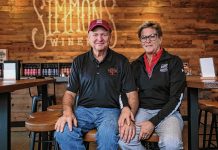As a college student, amateur artist, local photographer and guitar teacher, Columbus native Sarah Hayes has a lot on her plate — all of which she takes in stride.
At first glance, it is nearly impossible to notice the hearing aids tucked subtly behind the ears of the Bartholomew County 4-H Fair Queen pageant contestant.
Just before she turned 19, Hayes was diagnosed with sensorineural hearing loss, a condition caused by the breakdown of cilia within the inner ear.
Her hearing, which was 65 percent lost at the time of her diagnosis, has continued to worsen.
[sc:text-divider text-divider-title=”Story continues below gallery” ]Click here to purchase photos from this gallery
That has not stopped her, however, from pursuing her passions such as painting, photography and teaching guitar to children and adults at a local music store.
With this being fair season, the college junior is a member of the 4-H Fair Queen’s Court for the second straight year — having finished as third runner-up in Sunday’s pageant, and having been first runner-up the prior year.
Hayes, now 20, has learned to cope with and even leverage her new perspective with the ease of someone who has had years to adjust to hearing loss.
But it wasn’t until after she graduated in 2016 from Columbus North High School that Hayes became aware of her condition.
“I didn’t notice it was an issue,” Hayes said. “And then I was at work (at Chick-fil-A), and I was struggling to take orders, just through the drive-thru or at the register. I had no idea what people were saying to me. People would be trying to get my attention and I would have no idea.”
When her daughter mentioned her hearing was impacting her job performance, it concerned Melissa Hayes.
“There were times when we would tell her things, and at first you think it’s just your child kind of tuning you out,” Melissa Hayes said. “But at that point, we thought, there’s more to it.”
Once it became apparent that her muffled hearing was abnormal, Hayes visited a doctor.
“I said ‘I’ve noticed I can’t pop my ears. They’re popped, but I can’t un-pop them. I can’t hear, it’s so odd,’” Sarah Hayes recalled telling her doctor.
The doctor explained that seasonal allergies can sometimes affect hearing, and prescribed a basic allergy medication.
When her hearing still did not improve, Hayes was referred to an audiologist at Columbus Regional Health, who diagnosed her condition, she said.
Sensorineural hearing loss is an incurable genetic condition that typically skips generations; Hayes’ grandfather is almost completely deaf.
“There’s no way of correcting it permanently without giving you a device. So the only option I had was hearing aids,” Hayes said. “I remember the first time she (the audiologist) put them in my ears. Everything sounded different.”
Staying in control
Even though the hearings aids are barely visible, Hayes still made sure they were as attractive as possible by covering the plain color with Scotch tape that she painted with sparkling purple fingernail polish.
Creativity is a recurring theme in Hayes’ life, and her decorative hearing aids are just one example of how she refuses to let her condition impact that.
“She didn’t want to feel like this was going to exclude her from what she loved to do,” Melissa Hayes said. “She didn’t want to have to give up the things she was used to doing. Those things were such a big part of her life.”
Thanks to her perspective and with the help of technology, Hayes has been able to continue with activities she enjoys, such as teaching music.
“It doesn’t slow her down a bit here. She excels,” said Brian Standeford, Hayes’ boss at Guitar City & Sound Inc., where she gives lessons to students. “She’s great with kids, so that’s where she shines.”
While hearing loss may seem devastating for a music teacher, Hayes actually thinks it is an asset.
There is less pressure on the students, she said, because there is no need for them to be embarrassed if they make an error.
“I let them know, ‘You know, I don’t hear very well. So when you’re playing that, and it doesn’t sound great, I can’t hear it. I don’t know the difference. But the fact that you’re trying it, that you know that it needs to be improved, that’s all we need to know. You don’t need to care what I think,” she said.
It is one way that Hayes’ condition has contributed to, not taken away from her life. Another is sign language.
Embracing ASL
Since it is possible that she will lose her hearing altogether, Hayes has learned to read lips and is well-practiced in American Sign Language.
It has become a passion. After taking an ASL class at IUPUC, Hayes decided to transfer to the Indiana School for the Deaf in Indianapolis, where she is majoring in ASL and deaf studies.
“ASL is where I knew I could succeed,” she said. “It was something I knew I could be good at and could make a career (out of), because there are so many career opportunities with ASL that no one would have even thought of.”
Hayes said she had doubts about switching her major. A fervent animal-lover, she showed dogs in 4-H for nine years and originally studied to be a veterinarian.
She sees no reason, however, why she cannot combine ASL and her love for animals by training service dogs for deaf people, or training dogs to understand sign language.
As a contestant in the 2018 Bartholomew County 4-H Fair queen pageant, Hayes even told judges that she would love to see ASL started as a 4-H club.
“A lot of people could have fallen into the mode of ‘Poor me, why me, why is this happening?’ Melissa Hayes said. “But instead I think she has taken it to say, ‘How can I take what I’ve gone through and use it to help other people?’”
Although she can still hear by using hearing aids, Hayes views learning ASL and lip-reading not just as a backup plan in case she loses her hearing, but as opportunity to learn new skills.
“I was so afraid that this (communicating with hearing loss) was going to be an issue, but really it’s just kind of opened a door to get better at something,” she said. “There is this whole culture that was just so cool, and then I realized that I’m a part of it.”
As part of what she calls deaf culture, Hayes hopes to bring awareness to the importance of community residents learning ASL.
“I wish they (Columbus residents) would realize that there are more people with this problem than what they think there are. There are so many deaf people in our community, but they don’t feel included,” Sarah Hayes said.
Making conections
She said all establishments should try to have at least one employee who knows sign language. At Chick-fil-A, where Hayes still works, some customers will visit during her shifts because she can speak to them in sign language.
“It makes the biggest difference. It gets people connected; they feel like family,” Sarah Hayes said. “Just little things like that in our community make such a difference, and not only get deaf people involved, but get hearing people involved in the deaf culture, so that we can kind of bridge the gap.”
Even other seemingly small gestures, such as facing the person you talk to or patiently repeating sentences, are appreciated by those who struggle to hear, Hayes said.
She hopes that with increased awareness of deaf and hard of hearing residents, Columbus will become a place where all members of the community feel included.
“I really hope that eventually there won’t be a gap between the deaf community and the hearing community, and that instead we’ll be able to share our restaurants and our stores and community events and really bring those people together,” she said.
[sc:pullout-title pullout-title=”Sarah Hayes” ][sc:pullout-text-begin]
Age: 20
Parents: Alan and Melissa Hayes
Graduated: Columbus North High School, 2016
Attending: Indiana School for the Deaf, Indianapolis
Major: American Sign Language and deaf studies
Interests: Art, music, dogs
[sc:pullout-text-end][sc:pullout-title pullout-title=”Accommodating the deaf/hard of hearing” ][sc:pullout-text-begin]
These are some basic courtesies that Columbus residents can practice to accommodate the deaf and hard of hearing members of the community, courtesy of Sarah Hayes of Columbus:
- Face the person you are talking to, so that they can read your lips.
- Learn a few words in American Sign Language, even just basic greetings and questions.
- Patiently repeat yourself again if a hard of hearing person does not hear you speak to them, or understand what you said.
The Deaf-Hearing Communication Centre also provides these tips:
- Speak in a clear voice at normal volume.
- Avoid speaking too slow or fast in case the person prefers lip-reading.
- Take advantage of technology by typing back and forth via email, instant messenger or text messaging.
- Avoid excess background noise.
- Be sure to ask the deaf or hard of hearing person for ways to improve communication.
[sc:pullout-text-end][sc:pullout-title pullout-title=”On the Web” ][sc:pullout-text-begin]
Watch a video of Sarah Hayes at therepublic.com
[sc:pullout-text-end][sc:pullout-title pullout-title=”Pull Quote” ][sc:pullout-text-begin]
“ASL (American Sign Language) is where I knew I could succeed. It was something I knew I could be good at and could make a career (out of), because there are so many career opportunities with ASL that no one would have even thought of.”
— Sarah Hayes, Columbus
[sc:pullout-text-end]




